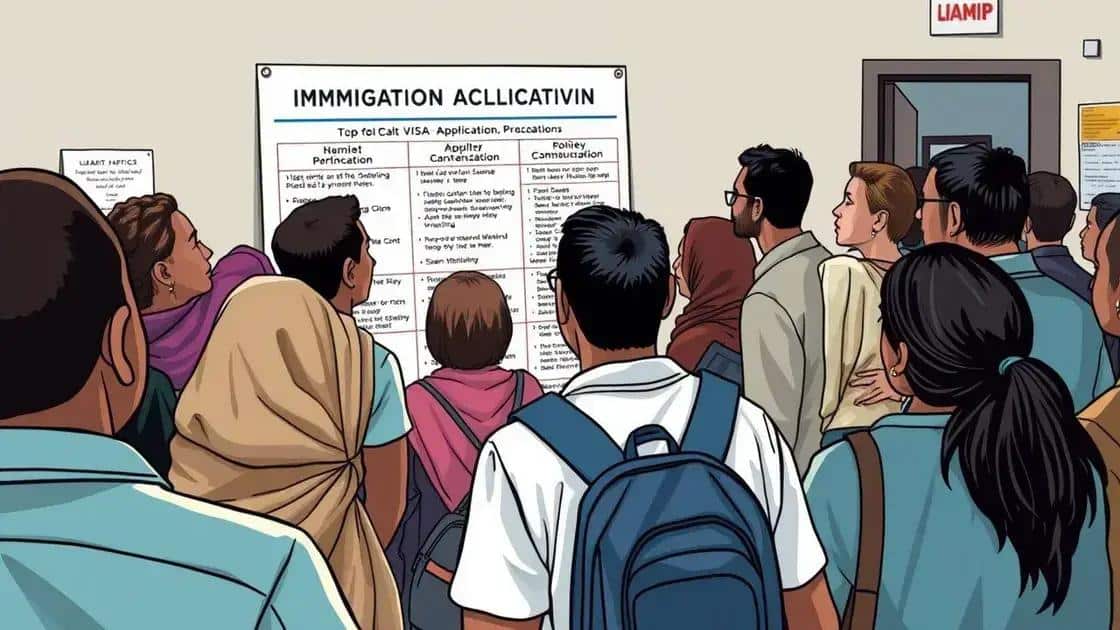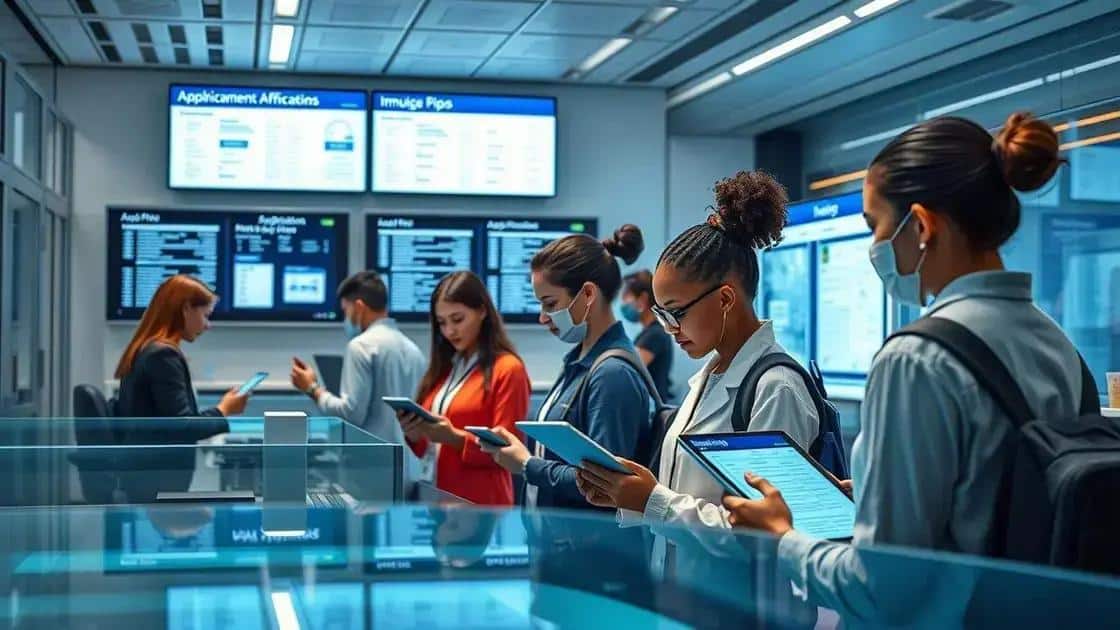Policy changes in immigration procedures that you should know

Policy changes in immigration procedures significantly impact eligibility, processing times, and family reunification, necessitating that immigrants stay informed to navigate these evolving requirements effectively.
Policy changes in immigration procedures are unfolding, and they could shape your path if you’re considering moving to a new country. A lot is happening, and it’s crucial to stay informed. Are you ready to dive into these changes?
Understanding recent updates in immigration policy
Staying well-informed about recent updates in immigration policy is essential for anyone considering relocation. Policies can change quickly, and understanding these shifts helps you navigate your options.
The Importance of Keeping Up
It’s vital to know how these changes affect you. New rules could influence everything from visa eligibility to the overall immigration process. Each update can bring new opportunities or challenges.
Key Changes You Should Know
- Streamlined processing: Some immigration procedures have been made faster to ease wait times.
- Eligibility adjustments: Changes in eligibility for certain visa types may impact many applicants.
- Increased scrutiny: Certain policies may introduce more thorough background checks and documentation requirements.
- Support for specific groups: New measures might aim to assist refugees and those with special circumstances.
Many people are directly affected by these changes. For example, individuals with pending applications may need to gather additional documentation due to enhanced scrutiny. Moreover, families looking to reunite will face new timelines based on current processing speeds.
Understanding these nuances offers a clearer picture of what to expect. With changes occurring frequently, proponents of immigration reform are urging for transparency and support. This effort encourages fair treatment and eliminates misinformation surrounding the processes.
That’s why it’s crucial to consult reliable sources—official government websites and trusted immigration attorneys can provide insights that greatly benefit your plans. Being proactive gives you the edge in adapting to any new challenges and opportunities that arise.
By paying attention to these developments, you can make better-informed decisions regarding your immigration journey. Keeping track of the latest updates will significantly benefit your planning and overall experience.
How policy changes affect visa applications

Understanding how policy changes affect visa applications is crucial for anyone hoping to immigrate. Recent shifts can have significant implications for processing times, eligibility, and requirements.
Changes in Eligibility Requirements
New policies can alter which applicants qualify for specific visa types. For instance, certain groups may receive priority, while others may face stricter criteria. This can lead to confusion and frustration among hopeful immigrants trying to navigate the system.
Impact on Processing Times
Visa processing times can be greatly affected by policy changes. For example, if an application process is streamlined, it may shorten wait times for those applying. Conversely, more rigorous checks can lead to delays. It’s essential to stay updated on these changes to better plan your application timelines.
- Faster approvals: Some visas may be approved more quickly due to efficiency improvements.
- Longer wait times: Increased scrutiny can lead to longer processing if more documentation is required.
- Humanitarian programs: Changes may prioritize humanitarian visas, providing quicker access for refugees.
- Documentation requirements: New policies might demand additional paperwork, influencing applicants’ preparedness.
As changes unfold, it’s helpful to seek guidance from professionals who understand immigration laws. Attorneys and consultants can provide insights, helping you prepare better for the application process. This support can be invaluable in ensuring you submit everything correctly and on time.
Moreover, having a clear understanding of new policies allows putative immigrants to adapt their strategies accordingly. This adaptability can make a notable difference in their experience and success rates.
Utilizing resources that provide timely updates is imperative. Following government announcements and trusted immigration news can keep you in the loop.
Key implications for immigrants and their families
Understanding the key implications for immigrants and their families in light of recent policy changes is essential. These shifts can significantly impact family dynamics, immigration status, and access to resources.
Family Reunification
Changes in immigration policy can directly affect how families reunite. Some policies may speed up the process, allowing relatives to be together sooner, while others may create barriers, causing delays. It’s important for families to be aware of these potential changes and how they may need to adjust their plans.
Access to Services
New policies may influence immigrants’ access to essential services, including healthcare, education, and social support. Depending on the regulations, immigrants might find it easier or harder to access these resources. This can have a profound effect on a family’s well-being and stability.
- Healthcare access: Policy changes can either expand or limit access to medical services for immigrant families.
- Educational opportunities: Shifts in policy might affect the eligibility of children in immigrant families for public education.
- Legal support: New rules may impact the ability of families to seek legal aid when needed.
- Employment prospects: Changes can influence job availability and work permit processes for immigrant families.
Many families are also concerned about the emotional implications of these changes. Uncertainty surrounding immigration status can lead to stress and anxiety. However, staying informed can empower families to make better decisions.
Communities can play a crucial role in supporting immigrant families. Local organizations often provide valuable resources and assistance in navigating the complexities of immigration policies. Engaging with these services can make a significant difference.
Lastly, sharing information within immigrant communities can foster a supportive environment. By collaborating and sharing experiences, families can better adapt to the changes in immigration policy.
Future trends in immigration procedures

Looking ahead, there are various future trends in immigration procedures that immigrants and advocates should be aware of. As policies evolve, understanding these trends can help applicants better prepare for their journeys.
Technological Advancements
One major trend is the increased use of technology in immigration processes. Many governments are adopting digital applications, reducing paperwork and streamlining processing times. This shift can make the experience more efficient for applicants.
Focus on Humanitarian Needs
An important focus for the future will likely be on humanitarian immigration. With global crises affecting millions, there is a growing emphasis on providing pathways for refugees and asylum seekers. Policies may become more accommodating to address these urgent needs.
- Digital platforms: Expect more platforms for applicants to track their visa status online.
- AI support: Artificial intelligence may assist in processing applications more quickly and accurately.
- Community involvement: Local organizations may play a larger role in supporting immigrants through the application process.
- Flexibility in categories: A wider range of visa categories might emerge to target specific community needs.
Moreover, we can anticipate that policymakers will increasingly collaborate with local governments and communities. This partnership can lead to more customized solutions that meet the specific needs of immigrant populations.
It’s also likely that public awareness and education about immigration policies will improve. As communities advocate for fair treatment and transparency, more individuals will become informed about their rights and options.
Staying informed about these trends is crucial. Immigrants who understand the changing landscape can better navigate their paths and advocate for themselves in the application process. By doing so, they can leverage new opportunities as they arise.
In conclusion, understanding the recent changes in immigration policies is essential for immigrants and their families. As procedures evolve, staying informed about new eligibility requirements, processing times, and the implications for family reunification will help people navigate the complexities of immigration. Embracing technology and community support will also play a significant role in this journey. By being proactive and informed, immigrants can better prepare themselves for the future.
FAQ – Frequently Asked Questions about Immigration Procedures
What are the latest changes in immigration policies?
The latest changes include adjustments to eligibility requirements and processing times, aimed at streamlining the immigration process.
How do these changes affect family reunification?
Some policies may expedite family reunification, while others could create obstacles, impacting how quickly families can be together.
What role does technology play in immigration procedures?
Technology is increasingly being used to simplify application processes and improve communication between applicants and immigration agencies.
How can immigrants stay informed about these changes?
Immigrants can stay informed by following official government announcements and engaging with local immigrant support organizations.





